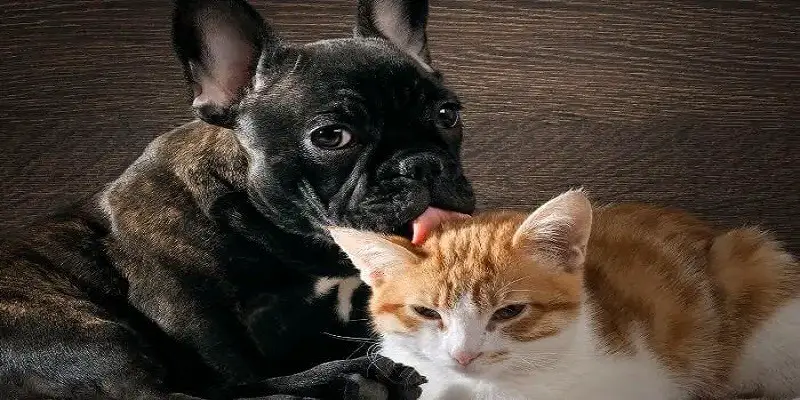Last Updated on January 14, 2025 by Pauline G. Carter
Yes, Cats are cleaner than dogs because they groom themselves more frequently. The debate over whether cats or dogs make better pets is a tale as old as time, with countless arguments favoring one side over the other.
One particular aspect of this debate that often comes up is cleanliness. Pet owners and enthusiasts frequently argue about whether cats or dogs maintain better hygiene and cleanliness. To understand this, we must delve into various factors such as grooming habits, living environment requirements, and health implications of each pet’s cleanliness.
Are Cats Cleaner Than Dogs?
Cats’ natural inclination towards self-grooming is a well-documented behavior, with their rough tongues effectively removing dirt, oils, and parasites from their fur. Dogs, however, enjoy activities that often lead to getting dirty, such as digging and rolling in mud. Despite this, dogs also have unique methods of keeping clean, such as shaking off water and dirt. The discussion extends beyond simple grooming habits to include considerations of health implications, environmental factors, and the care required to maintain cleanliness.
Grooming Habits
Cats are renowned for their meticulous grooming habits. They spend a significant portion of their day licking their fur to keep themselves clean. This behavior not only removes dirt and parasites but also helps them regulate their body temperature and reduce stress. Cats have a specialized tongue that acts like a brush to clean their fur efficiently. Furthermore, cats are known to be more discreet about their toilet habits. They usually bury their waste, reducing the spread of bacteria and odor in their living environment.
Dogs, on the other hand, do not groom themselves to the same extent as cats. While some dogs may lick their paws and fur, they rely more on their human companions for grooming. This includes regular baths, brushing to remove dirt, loose fur, and parasites, and cleaning their ears and teeth. Dogs also tend to be less particular about where they relieve themselves, which can sometimes contribute to a messier living environment unless their owners are diligent about cleanliness.
Living Environment Requirements
Cats, due to their grooming habits, generally contribute less to household dirt and odors. They are also smaller in size compared to most dog breeds, which means they bring in less dirt from outside. Their litter boxes can be kept clean with regular maintenance, making it easier to manage their waste.
Dogs often require outdoor time for exercise and bathroom needs, leading them to bring in more dirt and potential pathogens into the home. The size and breed of the dog can also affect the level of cleanliness. Larger breeds might shed more and bring in more dirt, whereas smaller breeds might be easier to manage in terms of cleanliness.
Health Implications
The cleanliness of pets also has direct implications on human health. Cats, being cleaner, might pose less risk of transmitting diseases to humans through dirt and parasites. However, it’s important to note that cats can still carry diseases such as toxoplasmosis, which is particularly harmful to pregnant women and individuals with weakened immune systems.
Dogs, while potentially bringing in more dirt and germs, can be kept healthy and clean with regular veterinary care and grooming. Proper care can minimize the risk of diseases being transmitted from dogs to humans. Moreover, the interaction and outdoor activities with dogs have been shown to boost the immune system and overall health of their owners.
Behavioral and Personality Differences
The cleanliness of a pet can also be influenced by its behavior and personality. Cats are often seen as more independent and fastidious about their cleanliness, requiring less intervention from their owners. Dogs, especially those that are highly active or enjoy playing outside, may require more effort from their owners to keep them clean.
FAQs
Are cats the cleanest pets?
Yes, Cats are often considered the cleanest pets due to their constant self-grooming habits. They spend a significant part of their day licking their fur to keep clean, removing dirt and parasites. This meticulous behavior contributes to their reputation for cleanliness.
What is the cleanest pet to have?
The cleanest pet to have is subjective and depends on one’s definition of cleanliness. However, small pets like hamsters or guinea pigs, which can be litter-trained and have less odor, are often considered clean. Fish, kept in well-maintained aquariums, are also a clean option as they don’t require grooming.
What is the cleanest animal?
Among animals, the capybara, a large rodent native to South America, is often cited as one of the cleanest. They are semi-aquatic creatures that spend a lot of time in water, which helps keep their fur clean and free from parasites.
Why do cats clean themselves but dogs don’t?
Cats clean themselves as part of their natural behavior to remove scent markers that might attract predators. This behavior is instinctual and helps them stay safe and clean. Dogs, however, rely more on their human companions for grooming and do not have the same instinctual drive to self-groom to the extent cats do.
Why are cats cleaner than dogs in Islam?
In Islam, cats are considered cleaner than dogs because they are viewed as more self-sufficient in maintaining their cleanliness. The Islamic tradition respects the cleanliness and independence of cats, allowing them to enter homes and even mosques, which underscores their clean nature in the Islamic faith.
Conclusion
Yes, cats are generally considered cleaner than dogs due to their grooming habits and less intrusive nature in their living environment. Cleanliness largely depends on the individual pet and the care provided by its owner. Cats may require less effort in terms of bathing and grooming but maintaining a clean litter box is crucial. Dogs might need more physical grooming and attention to keep their living spaces clean but engaging in these activities can strengthen the bond between dogs and their owners.

